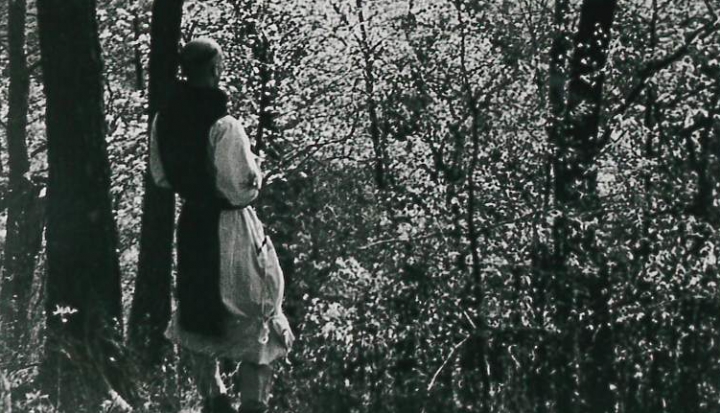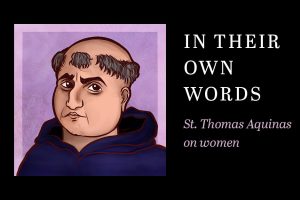By Thomas E. Blackburn
The article was originally published in the August 1972 issue of U.S. Catholic
Every time I start wrestling with the question of how to distinguish the development of a radical Catholic from the development of more ordinary Catholics, the question turns itself around on me. It is simpler to explain the Jesus People than to explain today’s average, church-going Christian. The Jesus People actually build their lives around what the other people say is the most important book in their lives.
Given an overwhelming majority of Americans who oppose the war in Vietnam; given a President who says he wants to end it; given the continuing technological slaughter, which question makes more sense: Why did you disrupt your life by burning draft records? Why do you continue to live your own, very private life?
When you talk to a “radical Catholic” the dominant impression is not that he or she is illogical or uninformed. On the contrary, he will be very logical and well-informed.
Franz Jagerstatter, the Austrian peasant who was beheaded for his refusal to fight in Hitler’s army, wrote: “There are only two alternatives possible: participation in the National Socialist Folk Community… must either help or hinder us Catholics in our efforts to gain salvation.” Jagerstatter saw service for Hitler as a dire and direct threat to his chance for eternal salvation, and he refused. His execution followed. His analysis was based on a very conventional Catholic upbringing. Compare him with say, Josef Goebbels—who also had a very conventional Catholic upbringing—and we can see who chose the better part.
Jagerstratter’s story, told by Gordon Zahn in In Solitary Witness, has been widely read by Catholic radicals. Another book that Catholic radicals have in common is Thomas Merton’s Seven Storey Mountain—a book that has also had a large readership among more traditional Catholics. In it Merton explains why he died to the world by going to a Trappist monastery, for reasons not unlike Jagerstratter’s reason for going to the execution.
Neither Jagerstratter nor Merton have been canonized yet. But Thomas More was, and he is another radical Catholic folk hero. Until a few years ago, priests were required at ordination to take an oath against modernism. The oath has since been dropped as a requirement for ordination; but while it was in effect a group of deacons at one Midwestern seminary found themselves troubled by it. They could not reconcile sections of the oath with some of the decisions of the Second Vatican Council. In effect, they felt, they were being asked to swear to combat what the Council urged them to teach. They went to a seminary official who told them, approximately, “Don’t worry about it. Obviously the oath can’t be in conflict with what the church teaches. Parts may be outmoded, but everyone takes the oath so don’t worry about it.”
That satisfied the deacons until, they say, A Man for All Seasons, the play based on More’s trial and death. The seriousness with which More took oaths moved them, and there was a polite, quiet revolt. As a result, here was one seminary in which the oath against modernism disappeared a year before the universal church stopped requiring it.
Thomas More and Jagerstatter were faced with extraordinary situations in which time was out of joint. Few of us can have any real idea of what we would have done in their situations. But More and the seminarians, encountered challenges in normal, everyday living—at the points in life where most of us tend to go along with whatever is customary. But in terms of the traditions of the church since the Apostolic period, what these men did was perfectly logical.
To argue with their decisions, you must argue on grounds of psychology, not logic. These people did deviate from the “norm,” from what everyone else was doing. The trouble with trying to build a case against them that way is that it is precisely this psychological appeal to what “most people do” that is regularly denounced from the pulpit. If most people approve of abortion, we are told, then most people are wrong and you don’t have to be psychotic to refuse to go along with them.
People who are perfectly logical tend to be cranks—people who organize their ideas so completely around a single idea of group of ideas that they are regarded as eccentric. The word is not necessarily pejorative. St. Francis of Assisi was a crank. He was so deeply committed to his Lady Poverty that his brothers and even Popes had to keep pulling him back from what appeared to them as eccentric excesses. The fact that no one has seen a naked Franciscan in public for centuries testifies to the success of his restrainers; but left to his own devises, St. Francis would have stayed naked after the scene with his father.
St. Francis heard Christ’s advice to consider the lilies of the field, and he acted on it. He chose poverty because Christ said it is easier for a camel to pass through the eye of a needle than for a rich man to get to heaven. Christ’s other followers explain that they needle’s eye was a gate to Jerusalem (it probably wasn’t) and that a camel had to get down on its knees (and pray?) to go through it. The context has almost nothing to do with prayer, but we favor a fanciful explanation for the hard saying while we cling tenaciously to the Magi, who are more important for the point they illustrate than for their real existence.
But who is the one who really needs to be explained: The Catholic who chooses voluntary poverty and works among the poor, or the Catholic who chooses the material goods of society and complains about the cost of welfare? The catholic who refuges to fight in what he believes is an immoral war, or the Catholic who answers the call, plays the army game, and finds himself a soft job in Saigon? The bishop who stays at the YMCA for $6 a day, or his brother bishops who stay in the big hotel for $17 a day?
I don’t ask these questions in order to pass judgement, but merely to highlight the question I started with: why do radical Catholics have to analyzed and explained?
Back to psychology. Several years ago, I travelled around the country interviewing students who had been conspicuous in Movement activities, both on Catholic campuses and at non-Catholic schools. Every single one of the students I talked to explained his role in demonstrations as the result of the factual, historical situation that led up to the particular demonstration.
Few of the students could even understand, much less answer, a psychological question. I would ask, in some form, “But why you? Didn’t your roommate know these things? Why did you demonstrate and not he?”
Blank. In the 1950’s, any college student could have explained any of his activities in terms of childhood training, value orientations or what happened once when he visited Aunt Minnie. But in the 1960’s sociology had replaced psychology as the queen of the social sciences among students, and you couldn’t get an answer to my question.
I suppose I was trying to find, with my question, evidences of generation gap, Oedipal problems, or some sort of family conflict. Instead, I found what Erik Erikson of Harvard told Anthony Lukas (in Don’t Shoot—We Are Your Children): “The values of any new generation do not spring full blown form their heads; they are already there, inherent, if not clearly articulated, in the older generation. The generation gap is just another way of saying that the younger generation makes overt what is covert in the older generation; the child expresses openly what the parent represses.”
I think that that is a very pregnant observation on what was going on in the student movement, and that it applies just as much to the current crop of Catholics radicals. I want to return to it in a moment, but here I use it only to illustrate the point that there is nothing psychotic in the apparently eccentric behavior of the Berrigans and Cullens and others of the so-called Catholic Left.
At the Catonsville Nine trail, Thomas Lewis said (I am quoting from Daniel Berrigan’s play, but the text is very close to the actual words of the testimony): “In Christianity we are taught that all men are a human family. Yet I was not profoundly moved about Vietnam until my younger brother went there. [Is this the beginning of the psychology of the deed? No.] Of course, in a Christian sense, one’s family is much more broad than the immediate family. The war helped to educate me.”
And Lewis adds: “I began to read and go to lectures about the war.”
One can guess what Lewis read; and the factual matters involved have been less and less in dispute. The former U.S. Chief Counsel at the Nuremberg War Crimes Trials, Telford Taylor, asks (in Nuremberg and Vietnam), “By what mad cerebrations could a ratio of 28 to 1 between our investments in bombing and in relief for those we have wounded and made homeless, have even been contemplated, let alone adopted as the operation patter (in Vietnam)?”
That’s $28 for war and $1 for the members of Lewis’ family. Does Lewis’ act need further explanation?
The original question was: How do you raise a Catholic radical? The answer seems to be: Let him live awarely in the modern world.
Only a little elaboration is needed.
As recently as 1963, Daniel Callahan was writing (in The Mind of the Catholic Layman): “What the Church has done is to retain the spiritual loyalty of the Catholic masses; what it has not done is to raise the religious ideals of the American layman much above the level of observance of elementary church laws.”
Today, among younger Catholics, the reverse of that statement is almost true. Concern for the poor, willingness to make sacrifices for justice, willingness to fast and pray are found in abundance. It is at the level of elementary church laws, particularly concerning the liturgy, that things seem to be falling apart.
When Callahan wrote, the forces that were going to change the analysis were already in motion. As nearly everyone knows, two of the main forces in this change have been education and communication.
When Andrew Jackson wanted to declare war on the Seminoles, in 1836, he asked Congress for $80,000. When Congress asked for more information it was told that American boys were already fighting and dying, and to delay would be a disservice to them. In the dark, Congress voted the appropriation.
News travels faster now. Right after the Gulf of Tonkin incident, Senator Wayne Morse was able to ask specific, embarrassing questions of the Administration. While the presumption that the President know more about it than Senator Morse at first overrode the senator, Morse was able to keep asking in front of the whole country, and the turn-around in public opinion began.
Educators, within living memory, used to place their chief emphasis upon codifying a body of facts to be learned. Today, instead, they place their main emphasis upon understanding the people to whom the facts are to be taught. The effects of this shift have been felt in every area of education. As they apply to religious education, there is less emphasis on memorizing the fruits of the Holy Spirit and more on the demands Christ makes on men living in contemporary society. This is in line with a concentration on the student, as the recipient of the education, rather than on the subject itself.
Furthermore, the new style of education is reaching more people. There are now about 30% of college-age people actually in college—compared to only 5% in 1900. What this means is that more and more people are being given the time to study and reflect on the theory of society—and to see the gap between theory and reality.
Those two factors together meant, among other things, that almost before the last bishop got home, the documents of Vatican II were available in paperback for a large audience of people who could understand them—a thing that had never happened with the documents of any previous council. If a local bishop said No to a specific proposal, there would be a pesky Catholic to tell him, “But it says here…”
The gap between theory and practice in society is something we have always had, of course. The difference today is that more and more people know the theory, and have advanced methods for gathering data and analyzing it to measure the practice.
Authority, therefore, has a harder time asserting itself without encountering an argument. Hence, the famous “credibility gap” of the Johnson administration. Hence, too, the often-remarked phenomenon in the recent ITT case, of people accepting columnist Jack Anderson’s story, where, in an earlier time, his disclosure would have taken much longer to gain public acceptance.
For Christians, the rule in such cases has always been, Render to Caesar the things that are Caesar’s. In a forthcoming biography, A Time to Dance, Michael Cullen of the Milwaukee 14 continually returns to that passage that Caesar is trying to take over the things that are God’s.
In Erik Erikson’s theory, what we are seeing among Catholic radicals is a making overt of what previously was covert. The younger radicals are from families in which, for example: 1) Parents had been involved in the Christian Family Movement, observing, judging and acting. The actions of their offspring go farther, but the principle is the same. 2) Bible study was encouraged, and even more than Zahn’s book on Jagerstatter, the Bible is the book of the Catholic radicals. 3) Parents saw a religious connection in their support of NAACP; and their children see a religious need to identify with the more outspoken, less polite, spokesmen for poor blacks.
In his encyclical, The Development of Peoples, Pope Paul sounded a note that would have been familiar to the parents of the radicals. Speaking specifically to youth, he wrote: “May all those who wish to belong to Christ hear His appeal: ‘I was hungry and you have me to ear, thirsty and you gave me to drink, a stranger and you took me in, naked and you clothed me, sick and you visited me, a prisoner and you came to see me.’ No one can remain indifferent to the lot of his brothers who are still buried in wretchedness, who are victims of insecurity, slaves of ignorance. Like the heart of Christ, the heart of the Christian must sympathize with this misery, ‘I have pity on this multitude.’”
The passage Pope Paul quotes from scripture was the marching order of the Catholic Action a few years back. The sons and daughters of Catholic Action are taking it one step further. They are not marching to a different drummer. They are only marching faster.
What is new, perhaps, is that they are not inclined to wait for authorities to tell them where to march. There is no simple answer to why this is so, but one factor probably is worth noting. The current generation of young Catholic radicals (and the older members, by and large, spent much time working with youth) had to face the question of the draft. As a group, they quickly learned that, first, the church has a theory of the just war and, second, that in World War II the Pope never spelled out its application, nor did any bishop apply it to his own country. In the long run, the bishops could make an announcement based on the research of historians and theologians. But in the long run, to adapt Lord Keynes, this generation would have been dead in a rice paddy. Or, perhaps more important to them, the war might have hindered them in their “efforts to gain eternal salvation.”
That’s not a full answer to the question of whatever happened to authority in the church, of course, but it is a note that must be sounded in answering the question.
At large in their low and high culture the radicals find one man alone dreaming the impossible dreams. It may have been John Wayne bringing law and order to the West; though, on reflection, today’s aware radical may decide that the Indians had law and order and John Wayne destroyed it. It may have been Thomas More, withstanding the advice of the English bishops. But the man of principle, bringing order out of the chaos by holding to his principles, has been there in the films and the literature of our time.
To dream the impossible dream may not necessarily be the best thing to do. Hitler’s Thousand Year Reich was an impossible dream. Even the thought of one man, scorned and covered with scars, tryng to restore, as Don Quixote did, an era of smelly knights in drafty castles with ignorant peasants leaves something to be desired. And, yes, the road the Hell is paved with good intentions.
But the road the Catholic radicals have taken is marked with Sacred Scripture, and their dream, to judge by the papers, is the most impossible dream of all, God’s kingdom of love and justice. What further explanation is needed?















Add comment